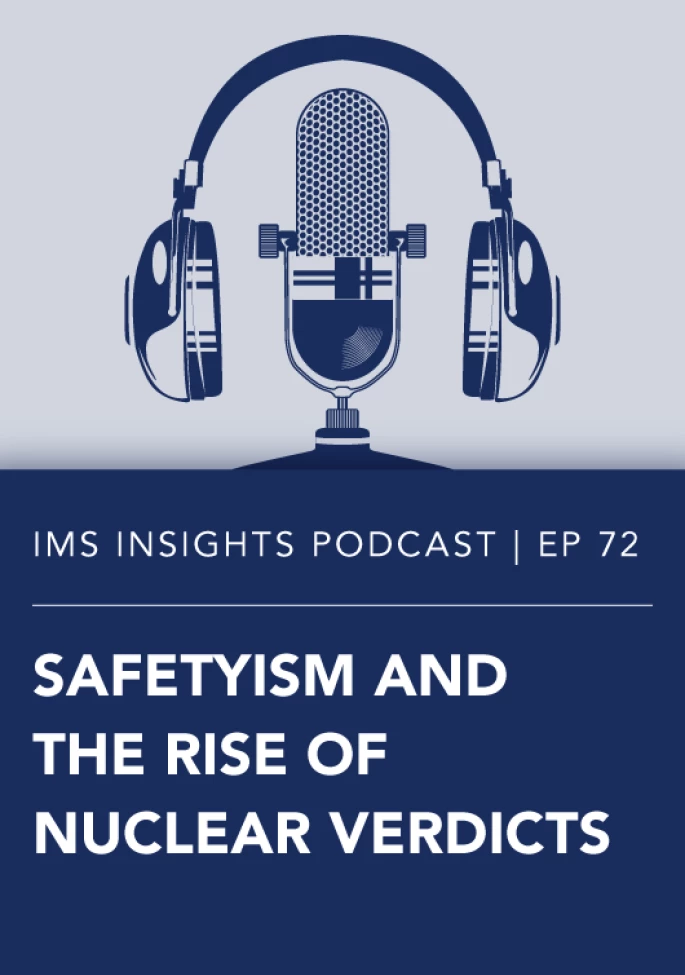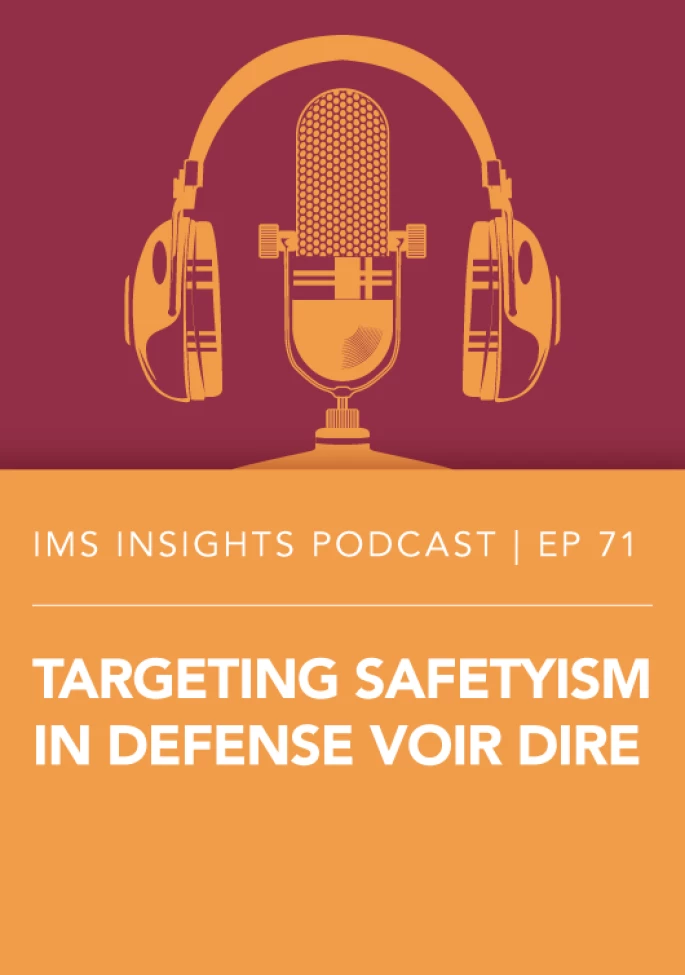Adam Bloomberg (Intro): Welcome to the IMS Insights Podcast, where the nation’s leading experts in litigation trends share their insights.
Chris Dominic: All right, Welcome, everyone. I'm Chris Dominic, a Senior Strategy and Jury Consulting Advisor at IMS. We partner with trial lawyers to help sharpen their litigation strategies and give them an edge in their cases and in the courtroom today. I have the pleasure of sitting down with Andrew Spingler, Andy to many of you, a seasoned trial consultant whose decades of experience have significantly impacted trial preparation and performance. Andy's insights have shaped countless cases and empowered attorneys to deliver their strongest, most compelling arguments and themes. We're here today to tap into Andy's wealth of knowledge. Here's some behind-the-scenes stories and learn some valuable strategies that can elevate any trial lawyer’s approach. Andy, thanks for being here.
Andy Spingler: Thanks, Chris. I'll try and live up to that billing. It's good to be with you again.
Chris Dominic: Yeah, it was fun writing that. By the way, there are many different types of consultants in the litigation support space, but Andy, you have a particular and very strategy-centric way of approaching cases and trial teams. Could you tell us a little bit about how you get the most out of them?
Andy Spingler: Yeah, I mean, I think I encourage trial lawyers, first and foremost, to think about what the end game is going to look like because that's really all that matters once you get to trial. And the process, the way it's set up before you get to trial is so arduous and there's so many petty discovery fights and things that you have to go through in case you settle that you don't often enough think about what is it really going to look like when we get to trial. And so our process, we encourage the lawyers to start at the end and work backwards. And that is, you know, many pro athletes do that all the time. They think about their performance and what is it actually going to look like, and in detail and in living color. How will I execute on this? And that's what our process is, it's designed to do is, is get the lawyers to focus on, you know, for instance, what is my closing argument at the end of the day? What do I hope my closing argument sounds like and then back up from that?
Chris Dominic: That's interesting because I think in consulting of any form, the methodology you choose is so important, right. And I was thinking, OK, well, what's a practical example of what you're describing right now?
Andy Spingler: Yeah, I mean the, an opening statement, I think here's a really good example. If you think about what an opening is. And we always try and focus on opening because it collects a lot of other things that need to be done. But focusing on an opening statement is really, really important, and getting people to voice and be performative in the midst of all the discovery stuff around what an opening statement sounds like. And then to map that in real time and to say, well, that may not work. Well, what if we got this piece of evidence? How about that? What would that sound like? What would that look like? So I mean, an example of that is an opening statement. You can do this with witnesses. You can, you can do it with, as I said, closing argument. But that's one example.
Chris Dominic: Yeah, I and one, I really appreciate it. I think that the opening in particular is such a great opportunity to anchor people on the focus of execution because it's so, so much of the trial is basically briefs and depositions and all of these things that it, it's tough to get out of at some point and put your mind on how am I going to actually execute getting this message across?
Andy Spingler: Yeah, no, I think that's exactly right. The, and the other thing too is, as you point out, is that, you know, there's a lot of little details that are going on sort of separately as the discovery process plays out and trial teams are working in their own little silos. And oftentimes one, one of the biggest mistakes I think trial teams make is that they end up at trial and they don't have a unified vision of what it's actually going to look and sound like. And thinking about that ahead of time not only pays dividends when you get to trial, it helps the trial team itself envision what it's going to look like. And there's a saying, “those that create tend to support,” and so giving everyone on the trial team an opportunity to create what it's going to look like to give their input, to give their special knowledge that they've collected in deposition A or Z or whatever. And their view of the case, their technical expertise with the expert that they're working with really creates a whole that is unified and sings when you stand up in front of a jury.
Chris Dominic: You know, I'm really glad you mentioned that because one of the things I've gotten out of our conversations is we both are interested in trial team effectiveness at some level, basically thinking through, how do I collaborate the best way. And I think from the fact that it's a competitive event we're in, right? It's an adversarial system, and if your team is performing better than the other team, that can be very powerful. There’s so…no, go ahead.
Andy Spingler: Yeah, I was going to say, you know, there is an old saying that there's a third of trials that you have that you are never going to lose. There's a third that you are never going to win. It's the third in the middle, the close ones where you earn your keep, and that's where you make your reputation. And you know, sort of contrary to what, you know, trial mythology is, there's rarely home runs in those third, that third in the middle. It's rarely home runs that make the difference. Much, much more often, it's the technical execution. It's what I call the small ball. It's the singles, it's the walks. It's performing the small stuff really well and enabling your team, the team as a whole, right. It's not a singular endeavor. It's, it's anybody, you know, who's been to trial. It's a collective effort enabling folks to play their role. Whether it’s consultants, whether it's the associates, whether it's your partner, whether it's the witnesses, enabling them to execute their role on a little level and lots of little levels is what adds up to what I call incremental advantage. And that's how you win at trial is gaining incremental advantage day by day. It's rarely a triple. It's almost never a home run. It's the small stuff.
Chris Dominic: Yeah, we are, we are really on the same choir. I want to ask you something. Well, what are what's one thing trial lawyers do in the courtroom that would help them the most, but seems to be what they find most difficult?
Andy Spingler: Yeah. Well, I mean, this is going to sound very pedestrian but showing up unprepared. I mean, I can't tell you the number of, and I think it has a lot to do with a lot of things, but I think one of the major forces that creates that unfortunate dynamic is the whole litigation process, which I view is sort of divorced from trial. Folks show up unprepared. And it goes without saying, jurors absolutely loathe that. They despise it and they can sense it because trial's always a comparison, right? If the other part of the other trial order shows up prepared and you're not prepared, you get undressed pretty quickly. Judges hate it and I guarantee you, your clients can't stand it. So, you know, I encourage folks to, again, back to the first point, think about what the end game's gonna look like and sound like. Be prepared and be prepared by envisioning that and preparing for it and making time for it. And there's creativity in all of that too. There's, there's the opportunity. I have clients have told me repeatedly that that part of trial, when they actually engage in it, make the time to do it. That creative process is one of the best parts of their job.
Chris Dominic: You know, it's funny because I just was talking to a group yesterday about this. And one of the things that I said to them was, remember, like if you were going to get ready to play golf or you were going to get ready to do some dancing, you wouldn't just think about it. You know, you'd practice it, you'd do it out loud. Like, the reason why I say this is because one of the things I've noticed over the years is there's a lot of writing of openings. It doesn't turn into actually standing up and practicing the opening.
Andy Spingler: Yeah, which is exactly my experience, right?
Chris Dominic: Because it's a skill that's performed a certain way. And if you said, yeah, I visualized my golf swing a lot. Yeah. Well, fun.
Andy Spingler: And then, you know, it is a really good example, the golf swing, because I know how uncomfortable I feel when I swing a golf club. And I think it's an uncomfortable experience for lawyers. And, and we're, we're in an age of the disappearing trial to some degree, right? You don't get that many reps, you don't get that, that opportunity very often. So it's a very foreign sort of internal feeling when you hear yourself voice something over and make mistakes. But instead of moving away from that, I encourage clients to embrace that, practice it, voice it, hear the sound of your own voice, because it's eliminating, eliminating those mistakes in a, in a, in a private moment or in a moment with just a couple of folks that you really trust. It's eliminating those mistakes then that prevents you from making them a trial. So you know, again, it's an old saying, but practice really does lead to perfection.
Chris Dominic: Do you have a favorite trial consultant cliche that actually turns out to be true?
Andy Spingler: Well, I think it, it's the one I gave you, which is a third of the trials you can never win, a third you could never lose. And a third you make your reputation on. And the thing is, you don't really know which third you're dealing with. It's, that's, typically you only know that in retrospect. So you kind of try, as a somewhat in this craft, you kind of have to treat them all the same as if they're that middle third. And then in retrospect, you'll know which ones were actually the ones that you made your chops on.
Chris Dominic: OK, so let's wrap it up with this one then. A big part of trial consulting is helping lawyers tell the clients stories. What's one story from your career that you think every lawyer can learn from?
Andy Spingler: Yeah. So we've worked with, over the years, some really, really good trial attorneys. And one of them who's at the very, very top, on the top shelf is John Kecker. And this is now decades ago, probably 25 years ago, we were in trial in Southern California. And it was first day of trial. And I had brought John to the courthouse, and we were walking down the hall of the courthouse, and he said, I love this day. And I said, what do you mean? Why do you love this day? Because it's the first day. I said so what, what do you love about the first day? He said, because this is, when we walk through those doors, this is when all the BS ends. You either have to put up or shut up. And, you know, I think it really does encapsulate a trial lawyer's mentality, which is, you really have to understand what it's going to be like when you walk through those doors and it all, all of that stuff is gone. And the sooner you envision what it's like when you walk through those swinging doors, the better off you're going to be.
Chris Dominic: Yeah, I love that. I have a similar story from a Texas attorney that we worked with for years who would have the same kind of a sentiment. His analogy was, we're calling the cards today.
Andy Spingler: Yeah, exactly. And you know, they, again it's hard. It's, this is difficult because you don't get the reps. The really good trial lawyers have had lots and lots of repetition and the muscle memory that comes with all of that. It's hard to gain that. So you have to develop an analog for it. You have to do that ahead of trial when you're not actually in trial.
Chris Dominic: Yeah, that's, I really enjoyed this, Andy. Thank you so much for offering.
Andy Spingler: My pleasure, Chris.
Chris Dominic: To discover how the IMS team can help your case get in an edge, check out imslegal.com or e-mail us at contactus@imslegal.com.
Adam Bloomberg (Outro): IMS has served trusted law firms and corporations worldwide for more than 30 years and over 65,000 cases. As a strategic partner for the full case life cycle, our integrated teams provide specialized advisory support, expert witness services, litigation consulting, visual advocacy, and presentation technology to elevate strategies and protect hard-earned reputations. Learn more at imslegal.com.








